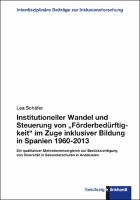Institutioneller Wandel und Steuerung von „Förderbedürftigkeit“ im Zuge inklusiver Bildung in Spanien 1960-2013
Ein qualitativer Mehrebenenvergleich zur Berücksichtigung von Diversität in Sekundarschulen in Andalusien
Abstract
Since the UN Convention on the Rights of Persons with Disabilities (UN-CRPD), inclusive education is a recurring topic in international and national discourse. Nevertheless, implementation is interpreted and realized differently at national and regional level. Legally, Spain already shifted its focus from segregated to integrative and finally to inclusive education long before the UN-CRPD and has one of the lowest segregation ratios of students with „special educational needs“ in Europe. Therefore, Spain is the primary focus of this study, which makes a contribution to international research on inclusion.Due to the qualitative multi-level approach of this study, the subject of research, the consideration of „special educational needs“ within the Spanish school system, can be analyzed at different levels and examined in some secondary schools in Andalusia on a regional basis. Therefore, the aim is to answer the question, which role disability plays in the context of the concept of diver-sity to guarantee inclusive education and equal opportunities. The analysis of the institutional change of „special educational needs“ since the democratization of the country on the national level is the basis of the study in order to derive this term historically, whose path-dependent development points to a high institutional stability both with regard to segregated forms of schooling and to the categorization of students. At the same time, the investigation at school level shows that asymmetrical control in combination with a high degree institutionalization of segregated structures leads to the reproduction of the legally established considerations of diversity of students in schools – although on the basis of diverging difference categories.
Keywords
Inclusive education, Diversity, Special education, Institutional change, Spain, Inklusion, Bildung, Sonderpädagogik, Wandel, Förderbedarf, Sekundarbereich, Sekundarschule, Heterogenität, Vielfalt, Bildungssystem, Chancengleichheit, Schüler, Schulsystem, Entwicklung, Institution, Bildungspolitik, Transformation, Schule, Institutionalisierung, Behinderung, Bildungsgeschichte, Geschichte <Histor>, 20. Jahrhundert, 21. Jahrhundert, Mehrebenenanalyse, Qualitative Forschung, Interview, Andalusien, Spanien, Steuerung, Inclusion, Education, Remedial instruction sciences, Special education for the handicapped, Special needs education, Change of society, Secondary education, Secondary school, Heterogeneity, Education system, Education systems, Equal opportunities, Equal opportunity, Pupil, Pupils, School system, Educational policy, School, Institutionalization, Handicap, History of education, History of educational activities, History, Hierarchical Linear Modelling, Multi-level analysis, Qualitative research, Andalucia, AndalusiaDOI
10.35468/5876ISBN
9783781524415, 9783781558762Publisher
Verlag Julius KlinkhardtPublication date and place
Bad Heilbrunn, 2021Grantor
Series
Interdisziplinäre Beiträge zur Inklusionsforschung,Classification
Educational strategies and policy: inclusion
History of education


 Download
Download Web Shop
Web Shop